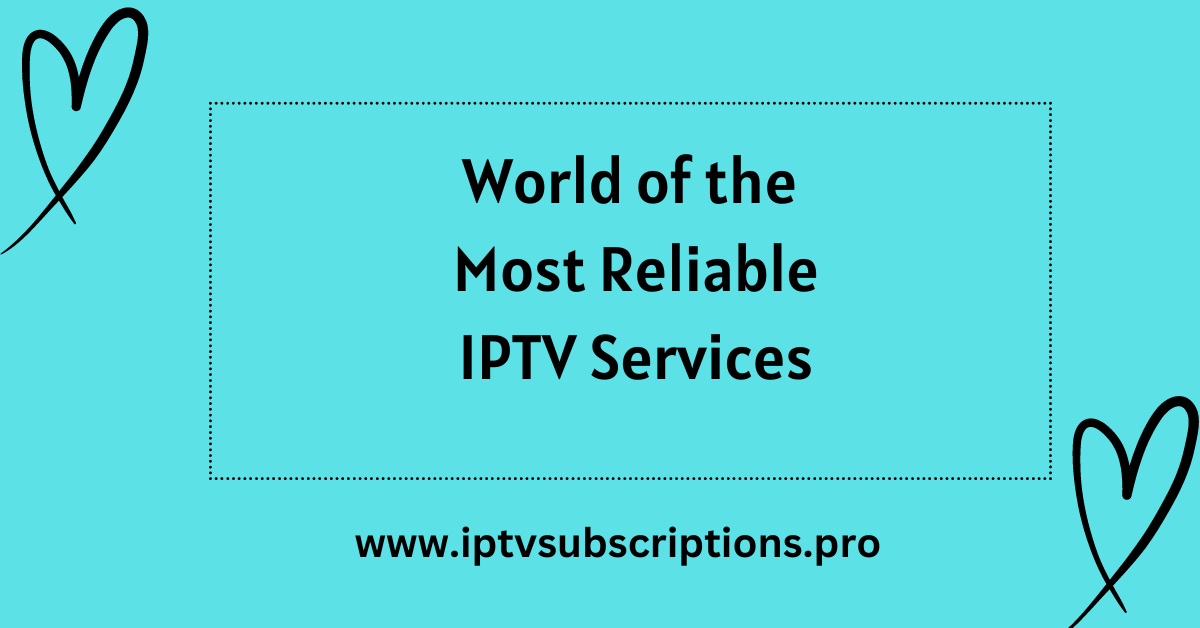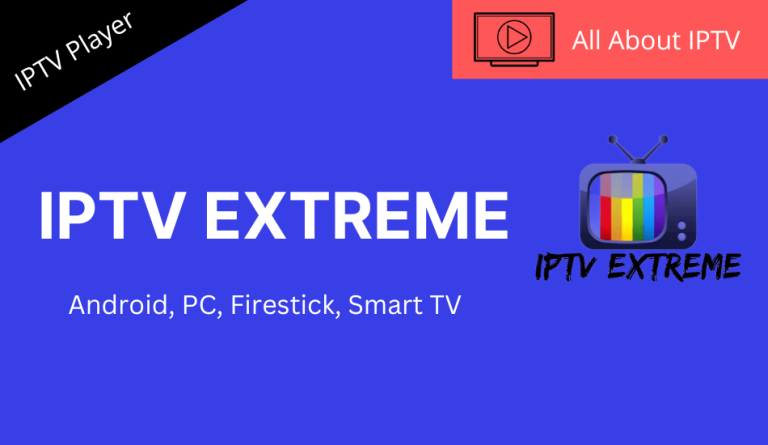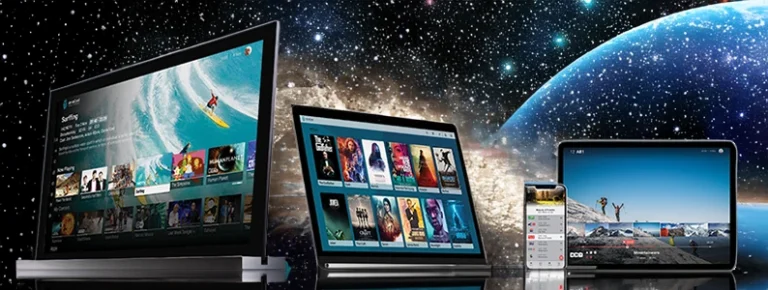Decoding Excellence: Navigating the World of the Most Reliable IPTV Services
Are you tired of endless searches for the most reliable IPTV service, only to be disappointed by the quality and consistency of available options? Navigating the sea of choices can be overwhelming, but fear not—we’ve got the answers you seek. In a world flooded with IPTV providers, finding one that truly stands out can be like searching for a needle in a haystack. What sets the most reliable IPTV apart from the rest? Let’s delve into this digital realm and discover the key to seamless streaming experiences.
IPTV Subscription
In a nutshell, the most reliable IPTV ensures uninterrupted streaming with high-quality content. Picture this: crystal-clear visuals, minimal buffering, and a vast array of channels at your fingertips. It’s not just about entertainment; it’s about an immersive experience that keeps you hooked. As we explore the landscape of IPTV, it becomes evident that reliability is the linchpin. So, who holds the crown in this competitive arena? Stay with us as we unravel the top contender, ensuring you make an informed decision for your streaming needs.

But what factors truly make an IPTV service reliable? From server stability to content diversity, the journey to the most reliable IPTV is a multifaceted one. Join us as we dissect the nuances, providing insights and guidance from industry experts who have scrutinized and ranked the contenders. Ready to dive deeper into the world of IPTV and discover the hidden gems that guarantee a seamless streaming experience? Let’s embark on this journey together – where every channel is a doorway to a world of digital entertainment.
Amazing IPTV A Review of the Features, Benefits, and Pricing Options
What Makes an IPTV Service Reliable?
Reliability is a crucial aspect of any IPTV (Internet Protocol Television) service, and several factors contribute to ensuring a positive user experience. Here are key elements that make an IPTV service reliable:
- Uptime:
- Definition:
Uptime refers to the amount of time a service is available and operational. - Importance:
High uptime is critical for uninterrupted viewing. A reliable IPTV service should have minimal downtime, ensuring users can access their content whenever they want. - Positive User Experience:
Consistent uptime contributes to a seamless and enjoyable viewing experience, preventing disruptions during live events or favorite shows.
- Stream Quality:
-
- Definition:
Stream quality relates to the resolution, clarity, and stability of the video stream. - Importance:
Users expect high-definition content with minimal buffering or pixelation. A reliable IPTV service should consistently deliver excellent stream quality. - Positive User Experience:
Crystal-clear video and audio enhance user satisfaction, making the viewing experience more immersive and enjoyable.
IPTV Reseller
- Definition:
- Customer Service:
- Definition:
Customer service involves the support provided by the IPTV service to address user issues or inquiries. - Importance:
Effective and responsive customer service is crucial for resolving technical problems, answering questions, and providing assistance. - Positive User Experience:
Prompt and helpful customer service contributes to user confidence, as subscribers feel supported in case of any issues, fostering a positive overall experience.
- Channel Variety:
- Definition:
Channel variety refers to the diversity of content available on the IPTV service, including different genres, languages, and types of channels. - Importance:
A wide range of channels caters to diverse viewer preferences, ensuring there is content for everyone. - Positive User Experience:
A comprehensive channel lineup increases the appeal of the service, offering users more options and enhancing their satisfaction with the content available.
- Reliable Infrastructure:
- Definition:
The underlying technology and infrastructure that support the IPTV service, including servers and network capabilities. - Importance:
A robust infrastructure is essential for handling user traffic, preventing server overloads, and ensuring smooth content delivery. - Positive User Experience:
A reliable infrastructure contributes to fast load times, minimal buffering, and overall system stability, enhancing the user’s perception of the service.

Evaluating IPTV Providers
Evaluating IPTV providers involves considering several key factors to ensure that the service meets your specific needs and preferences. Here are some important aspects to consider when assessing IPTV providers:
- Content Selection:
- Channel Variety: Evaluate the range of channels offered, including local, international, and premium channels. A diverse selection caters to different viewer preferences.
- Video-On-Demand (VOD): Check for a robust library of on-demand content, including movies and TV shows, allowing users to watch content at their convenience.
- Quality of Service:
- Stream Quality: Assess the quality of video streams, including resolution and stability. Look for providers that offer high-definition content with minimal buffering.
- Uptime: Research the provider’s track record for uptime to ensure consistent and reliable access to content.
- Compatibility and Device Support:
- Device Compatibility: Confirm that the IPTV service is compatible with the devices you use, such as smart TVs, streaming devices, smartphones, and tablets.
- App Availability: Check if the provider offers dedicated apps for popular platforms, making it convenient to access content on different devices.
- User Interface (UI) and User Experience (UX):
- Ease of Use: Evaluate the user interface for its simplicity and intuitiveness. A user-friendly interface enhances the overall experience.
- Features: Look for additional features like easy navigation, personalized recommendations, and the ability to customize settings.
- Customer Support:
- Response Time: Investigate the provider’s customer support responsiveness. A timely and helpful customer service team can assist with technical issues or other concerns.
- Support Channels: Check the available support channels, such as live chat, email, or phone support, to ensure that you can reach the provider easily.
- Subscription Plans and Pricing:
- Cost: Consider the affordability of the subscription plans, including any hidden fees. Compare the pricing with the features and content offered.
- Trial Periods: Look for providers that offer trial periods or money-back guarantees, allowing you to test the service before committing.
- Reliability and Reputation:
- Provider Reputation: Research customer reviews, forums, and feedback to gauge the reputation of the IPTV provider. A positive track record is indicative of a reliable service.
- Longevity: Consider how long the provider has been in the market. Established services may be more reliable than newer, untested ones.
- Legal Considerations:
- Content Licensing: Ensure that the provider has the necessary licenses for the content it offers to avoid legal issues.
- Geographical Restrictions: Be aware of any geographical restrictions that may limit access to certain content based on your location.
By carefully assessing these factors, you can make an informed decision when choosing an IPTV provider that aligns with your preferences and provides a reliable and enjoyable streaming experience.
Top Reliable IPTV Services
- IPTV Smarters Pro:
- Known for its user-friendly interface and compatibility with various devices.
- Supports a wide range of channels and VOD content.
- Helix IPTV:
- Notable for its stable service and high-quality streams.
- Offers a diverse range of channels and VOD options.
- Vader Streams:
- Has been praised for its reliability and extensive channel lineup.
- Provides a user-friendly interface and good customer support.
- Area 51 IPTV:
- Known for its affordable plans and a large selection of channels.
- Offers reliable streaming quality and good customer service.
- Eternal TV:
- Recognized for its stable service and consistent uptime.
- Provides a variety of channels and VOD content.
- Sportz TV:
- Particularly popular for sports content, but also offers a broad range of channels.
- Known for its reliable streaming quality.
- Express IPTV:
- Offers a user-friendly interface and stable streaming.
- Known for its wide variety of channels and VOD content.
- Sling TV:
- A legal and well-established IPTV service.
- Provides a range of subscription options with live and on-demand content.
Always ensure that you choose a service that aligns with your needs, complies with legal requirements, and has positive reviews from users. Before making a decision, check for the most recent information and user feedback to ensure the reliability of the IPTV service you are considering.
The Future of IPTV
The future of IPTV (Internet Protocol Television) is likely to see continued evolution and innovation as technology advances and consumer preferences change. Here are some trends and possibilities that may shape the future of IPTV:
- 5G Integration:
- The rollout of 5G networks is expected to significantly impact IPTV. Faster and more reliable 5G connections will enhance the streaming experience, allowing for higher resolution, lower latency, and improved overall performance.
- The rollout of 5G networks is expected to significantly impact IPTV. Faster and more reliable 5G connections will enhance the streaming experience, allowing for higher resolution, lower latency, and improved overall performance.
- Interactive and Personalized Content:
- IPTV services may become more interactive and personalized, leveraging data analytics and artificial intelligence to tailor content recommendations based on individual viewing habits and preferences. This could enhance user engagement and satisfaction.
- IPTV services may become more interactive and personalized, leveraging data analytics and artificial intelligence to tailor content recommendations based on individual viewing habits and preferences. This could enhance user engagement and satisfaction.
- Augmented Reality (AR) and Virtual Reality (VR):
- Integration of AR and VR technologies into IPTV experiences could create immersive content and viewing environments. This could lead to more interactive and engaging ways to consume entertainment, especially in gaming, sports, and educational content.
- Integration of AR and VR technologies into IPTV experiences could create immersive content and viewing environments. This could lead to more interactive and engaging ways to consume entertainment, especially in gaming, sports, and educational content.
- Cloud-Based Services:
- Increased reliance on cloud-based services may simplify access to content, making it available across various devices seamlessly. Cloud-based IPTV solutions could enhance flexibility, scalability, and ease of use.
- Increased reliance on cloud-based services may simplify access to content, making it available across various devices seamlessly. Cloud-based IPTV solutions could enhance flexibility, scalability, and ease of use.
- Integration with Smart Home Ecosystems:
- IPTV services may integrate further with smart home ecosystems. This could involve seamless connectivity with smart devices, voice-activated controls, and the incorporation of IPTV into broader home automation systems.
- IPTV services may integrate further with smart home ecosystems. This could involve seamless connectivity with smart devices, voice-activated controls, and the incorporation of IPTV into broader home automation systems.
- Advanced User Interfaces (UI) and User Experience (UX):
- IPTV interfaces may evolve to become even more intuitive and user-friendly. Advanced UI/UX designs, voice control, gesture recognition, and other innovations could enhance the overall viewing experience.
- IPTV interfaces may evolve to become even more intuitive and user-friendly. Advanced UI/UX designs, voice control, gesture recognition, and other innovations could enhance the overall viewing experience.
- Global Expansion and Localization:
- IPTV services may continue to expand globally, offering localized content to cater to diverse cultural and linguistic preferences. This could involve partnerships with local content providers and the inclusion of more international channels.
- IPTV services may continue to expand globally, offering localized content to cater to diverse cultural and linguistic preferences. This could involve partnerships with local content providers and the inclusion of more international channels.
- Integration of E-Commerce and Social Features:
- IPTV platforms might integrate e-commerce features, allowing users to make purchases directly through their TV screens. Additionally, social features could be enhanced, enabling users to share content, recommendations, and experiences within the IPTV ecosystem.
- IPTV platforms might integrate e-commerce features, allowing users to make purchases directly through their TV screens. Additionally, social features could be enhanced, enabling users to share content, recommendations, and experiences within the IPTV ecosystem.
- Enhanced Security Measures:
- As the importance of content security grows, IPTV services may implement advanced encryption techniques and robust security measures to protect against piracy and unauthorized access.
- As the importance of content security grows, IPTV services may implement advanced encryption techniques and robust security measures to protect against piracy and unauthorized access.
- Regulatory and Legal Developments:
- The regulatory landscape surrounding IPTV may evolve, with increased scrutiny on content licensing, copyright issues, and adherence to regional broadcasting regulations. Legal developments could impact how IPTV services operate and distribute content.
it’s important to note that the future of IPTV will likely be influenced by a combination of technological advancements, market demands, and regulatory considerations. As the industry continues to mature, users can expect more sophisticated and diverse options for accessing television content through IPTV services.
Conclusion
In conclusion, the future of IPTV holds exciting possibilities driven by advancements in technology, changing consumer behaviors, and the evolution of the media landscape. Key trends shaping the future include the integration of 5G networks for improved performance, the emergence of interactive and personalized content experiences, and the potential incorporation of augmented reality (AR) and virtual reality (VR) technologies.
Cloud-based services are expected to play a pivotal role, offering increased flexibility and accessibility across various devices. As IPTV services continue to expand globally, there’s a growing emphasis on localization, with providers seeking to cater to diverse cultural preferences and languages.
The integration of IPTV into smart home ecosystems is likely to enhance the overall connected living experience, incorporating features such as voice control, gesture recognition, and seamless connectivity with other smart devices.
Moreover, the evolution of user interfaces and experiences is anticipated, with a focus on making IPTV platforms more intuitive, user-friendly, and interactive. The potential integration of e-commerce and social features could further transform the way users engage with content.
Security measures are expected to advance to protect against piracy and unauthorized access, addressing growing concerns in the digital content distribution landscape. Additionally, regulatory and legal developments may shape the operational landscape for IPTV services, with a focus on content licensing, copyright issues, and adherence to regional broadcasting regulations.
Overall, the future of IPTV appears dynamic, with continuous innovation enhancing the viewing experience, expanding content choices, and offering users more ways to interact with and personalize their entertainment. As these trends unfold, users can anticipate a television landscape that is not only technologically advanced but also more tailored to individual preferences and seamlessly integrated into their daily lives.







